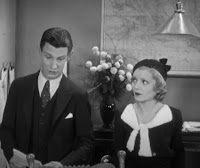Ambitious reporter Jerry Hampton (Peggy Shannon) has a scoop, an article about an illicit love nest suicide, but her editor kills it because it involves the rich and influential J.H. Smith. Her boyfriend Brice (Russell Hopton), also a reporter, wants to get married but she's not ready to settle down, so he advises her to get a job on a small-town paper where she can have an impact. Brice's uncle Martin Blake (Edwin Maxwell) is the president of the bank in the small California town of Apex, where the retiring head of the local paper is looking for someone to take over. Sam (Claude Gillingwater) is reluctant to hand over the reins to a woman, and her first act is to antagonize the paper's biggest advertiser Nathan Young (David Callis) by writing about his brother's divorce. When he threatens to pull his ads, she claims that she is about to accept competing ads from mail order companies out of town, and Nathan caves. Sam is won over and Nathan becomes her platonic buddy, running her around town on errands and getting involved in her investigation into a local oil well operation. Blake, the bank president, has encouraged the people of Apex to invest in the well, but Sam smells a rat, and sure enough, the well supervisor comes to Jerry and tells her the well is a bust. Blake has announced he will buy up the townspeople's shares, at a fraction of what they paid (which you may recall was a strategy in old man Potter's bag of tricks in It's a Wonderful Life), and suspicious Jerry, along with Nathan, starts nosing around and soon breaks the news that the well is actually fully functioning. The citizens celebrate and Apex becomes a boom town, but the angry Blake gets his revenge by calling in loan payments that he knows the paper cannot make. He plans to take over the paper, firing Jerry and, to add insult to injury, installing her boyfriend Brice as editor. Can Jerry out-scheme Blake and keep her job and her boyfriend?
This is a rather delightful movie, if you keep your expectations on a low-budget pre-Code level. The plot is complex enough to keep you interested but not so convoluted as to cause confusion. It manages to stymie some expectations one might have about its heroine: she is strong and independent, she sustains a non-romantic friendship with a male, and her boyfriend is not jealous of her commitment to a work life. The movie has a low-budget look but that winds up being almost a plus, as the newspaper office has an authentic small-town feel to it. Generally, the acting is fine. Peggy Shannon eventually became an alcoholic and died less than ten years later, but she fits her role here perfectly. Maxwell does his usual good work in a villainous role; Hopton disappears in the middle of the story, but makes a good impression when he’s around. Sterling Holloway has a comic relief role as a (possibly gay) gossip columnist; many reviewers of this film find him irritating, but I don't mind him. This is the kind of story that lends itself to a typical melodramatic treatment, but the tone is kept fairly light and upbeat. I viewed this on DVD as part of a set from Flicker Alley called In the Shadow of Hollywood: Highlights from Poverty Row, and it's been given a spectacular restoration. The audio commentary, as most are these days, is hit and miss. The commentator misidentifies actor Claude Gillingwater as Gillingworth throughout, and is repetitive with her social context points. I recommended the movie if not the commentary. Pictured are Callis and Shannon. [Blu-ray]


No comments:
Post a Comment